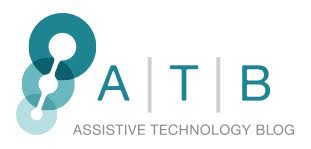[VIDEO] Assistive Technology For Quadriplegic Student: Conversation With Francis Feoko
I recently got a chance to talk with Francis Feoko, a C5 quadriplegic, who is a sophomore in the Bay Area in California. Francis wanted to share with Assistive Technology Blog’s readers how, being a college student, he takes care of his home and school work and how technology has made him more confident and self sufficient in a classroom setting. He wants other students with disabilities to know that there are options available out there that can make working on classwork and homework a breeze. Technology has boosted Francis’ self esteem and motivated him to do things on his own.
What’s great about Francis’ setup is not just his device of choice, which is iPad 2, but also his mindset and willingness to explore assistive technology devices for himself, which is really important. There are so many devices available now, but which one suits us best in different circumstances? Francis also reminds us that “what works best for me may not work for others”.
Francis uses different apps for different classes – For his math class, he uses Notes Plus, an app that gives him lots of flexibility in terms of drawing graphs and using various shapes and symbols for his math homework. Since he is C5 quadriplegic, he cannot use his fingers, so he uses his pinky finger’s knuckle to write his equations. (he has used a stylus in the past but has gotten used to his pinky for writing now) Once done, he likes to email his homework to himself so he could review, reorganize and make changes as needed, before submitting it to his teacher. Francis used to have a notetaker who would take notes for him in class, but now he just uses the iPad to take notes himself.
Notability is another app he uses for “visual learning”. Notability lets Francis copy and paste images from the internet, so if he is learning something and wants to use pictures to help him understand the concepts better, he uses Notability that lets him add and organize pictures into his notes to make them more visual.
Since he is a computer science student, Francis has to write code for his C++ or HTML homework. In order to do that, he remote logs in to his laptop computer through his iPad using an app called Splashtop. Sometimes it is not easy for him to take his laptop to school, but thanks to Splashtop, he can access his laptop even when he doesn’t physically have it with him.
Francis also uses Read&Write Gold to have his notes read back to him, although later in the conversation he suggests that many iOS apps now have the ability to read notes back to the user. One advice he has for other students with disabilities is to explore assistive technology options before signing up for a class. Some classes may require special accessibility options that may not be available at school.
Francis also feels like more people with disabilities should be employed in the technology industry since they are daily users and understand what exactly needs to be developed to take accessibility to the next level. He works part time at his school’s Disability Resource Center where he works with their Assistive Technology Specialist who is on top of things, and knows about all the newer apps that are being released. Francis is also a client of Department of Rehabilitation and encourages others to be one too. Through the department, he gets in touch with other experts who help him with other accessibility needs. For example, the experts at his local department of rehabilitation office made a front mount for his backpack so he has easy access to his things all the time.
Here is a video of me chatting with Francis. What was supposed to be an interview turned out to be a casual and candid conversation where Francis shares his experiences and insights about his disability and how technology has been helping him be more and more self sufficient. During this conversation, he also mentions his love for the Assistive Technology Blog and how he has been sharing posts from this blog with his friends and teachers in his native country Fiji!
Thanks for a great conversation, Francis!



it would be very much better if all languages can be usef inthis device